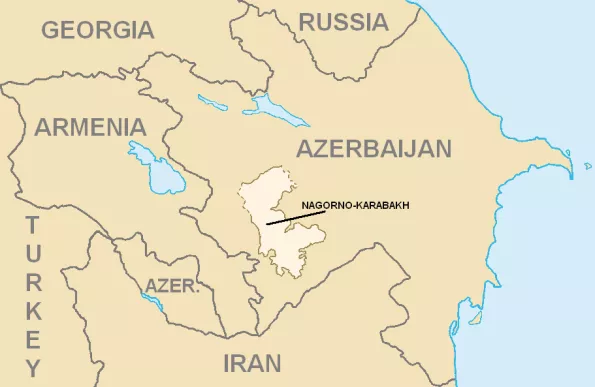
A soldier looks over a valley, standing next to the flag of Armenia. Photo: AP Photo/Sergei Grits.

Orinoco Tribune – News and opinion pieces about Venezuela and beyond
From Venezuela and made by Venezuelan Chavistas

A soldier looks over a valley, standing next to the flag of Armenia. Photo: AP Photo/Sergei Grits.
The long, blood-soaked dispute between ethnic Armenians and Azerbaijanis over the remote, mountainous region of Nagorno-Karabakh came to a crashing conclusion Thursday as the self-proclaimed republic announced plans to disband. Sputnik turned to one of Russia’s top Caucasus affairs experts to find out how Karabakh’s autonomy could have been saved.
Nagorno-Karabakh has agreed to formally disband its state institutions effective January 1, 2024, with the move set to formally restore the long-disputed region’s status as part of Azerbaijan.
In a decree published Thursday, Republic of Nagorno-Karabakh President Samvel Shahramanyan stated that the decision to disband the self-proclaimed republic was “based on the priority of ensuring the physical security and vital interests of the people of Karabakh,” and to allow any ethnic Armenians wishing to leave the region to do so. Shahramanyan urged those Armenians choosing to remain behind after January 1, 2024 to “familiarize themselves” with the conditions of reintegration into Azerbaijan presented by Azerbaijani authorities.
Azerbaijan and Armenia Agree to a Ceasefire in Nagorno-Karabakh
Over 75,000 of Karabakh’s mostly ethnic Armenian population of 145,000 have now left the region, becoming refugees overnight.
Shahramanyan’s surprise announcement comes just days after Azerbaijan launched a brief “anti-terrorist” operation in Karabakh, quickly overrunning up to 90 sites controlled by Karabakh militias, with Russian peacekeeping forces brokering a ceasefire to prevent further bloodshed. Subsequently, Nagorno-Karabakh agreed to disarm and start talks with Baku on reintegration.
Thursday’s announcement marks a stark end to the current chapter of a territorial dispute going back more than a century, which burst into the flames of open conflict between ethnic Armenians and the Azerbaijani state in the late 1980s, several years before the collapse of the Soviet Union.
Could Karabakh Have Saved Its Autonomy?
Karabakh’s fate was effectively sealed with the election of Nikol Pashinyan as Armenia’s prime minister in 2018, says Stanislav Tarasov, a veteran Russian political scientist specializing in Caucasus affairs.
“The fact is that he tried to get rid of Karabakh from the very beginning after coming to power,” Tarasov told Sputnik, noting that Pashinyan refused to play any of several trump cards he had in his hands to save the region’s autonomy while ensuring peace with Azerbaijan.”
There were multiple reasons for this, according to Tarasov, starting from Karabakh Armenians’ political passion – which for many years gave them significant political sway in Armenia proper.
The Karabakh situation that Pashinyan “inherited” from his predecessors was very different from the reality on the ground today, Tarasov noted, pointing out that five years ago, the self-proclaimed republic’s disciplined, well-armed militias controlled seven regions, or some 20 percent of territory internationally recognized as part of Azerbaijan. Before the 2020 conflict, which Pashinyan “initiated and practically provoked,” according to Tarasov, Yerevan had many opportunities to reach a political solution which Baku would find amenable, such as returning some Karabakh-controlled Azerbaijani territory surrounding the exclave in exchange for special status.

After the 2020 conflict, Tarasov noted, Pashinyan “surprised” Baku by agreeing to recognize Azerbaijan’s territorial integrity in normalization talks in Prague in October 2022 brokered by France and the European Union, effectively signing away Karabakh in the process.
“After Karabakh became Azerbaijanian territory, it became clear that discussion of the issue transformed from self-determination to the fate of the Armenian enclave within Azerbaijan,” Tarasov said, adding that after that, Pashinyan began making moves to complicate relations with Moscow – which served as the main peace broker standing between the conflicting sides.”
“Ultimately, Azerbaijan became confident that Armenia wouldn’t come to Karabakh’s aid,” and Pashinyan “didn’t even try to send troops and fight,” Tarasov stressed.
“He simply abandoned these people and blamed Russia for everything. Even though it was Russia seeking to resolve the conflict through peacekeepers, bases, etc. That is, he had a 100 percent chance of getting support from Moscow for an exchange of territories controlled by the Armenians for special status for Karabakh. And Azerbaijan was prepared to agree to this,” Tarasov said. “This project was completely crossed out by Pashinyan.”
West’s Corrosive Role
Asked to compare the roles played by Moscow and the West in trying to resolve the Karabakh crisis, Tarasov pointed out that Russia’s mediation included an actual presence on the ground in the form of peacekeepers, while the West’s efforts have been limited to empty “political declarations,” which are not backed by real power.
Despite this, Tarasov stressed, Pashinyan “surrendered Karabakh, betrayed Russia, and began to take guidance from the statements made by the West.”
“Today, a mass exodus of Armenians is taking place comparable to the 1915 Armenian Genocide under the Ottoman Empire, while the West makes statements, sends some missions. But they are not able to provide real support. Meanwhile, Russian peacekeepers are saving Armenians. This is what we are seeing today,” Tarasov said.
Asked to comment on USAID chief Samantha Power and Deputy Secretary of State Yuri Kim’s visit to Yerevan this week, Tarasov said that the US officials seem to have been preparing a Kosovo or Bosnia-style “Balkan scenario” of a “joint administration” of Armenians and Azerbaijanis in Karabakh.
As always, Tarasov stressed, USAID hides behind its mission of providing humanitarian assistance to developing countries and conflict-hit areas, while their real interest revolves around Washington’s messianic “democratization” mission. “I reiterate that besides statements, they haven’t been able to do anything for the Armenian people; only Russia made efforts in this direction. The US’s only desire is to have greater influence by clinging to Armenia,” the observer summed up.
(Sputnik) by Ilya Tsukanov
BLA